|
|
|
Sort Order |
|
|
|
Items / Page
|
|
|
|
|
|
|
| Srl | Item |
| 1 |
ID:
172574


|
|
|
|
|
| Summary/Abstract |
There has been speculation for some time that unmanned ground vehicles (UGVs) are poised to revolutionize military land operations. These expectations have amplified with recent developments, not least the reported deployment and testing of Russian weaponized UGVs in Syria. Yet when it comes to the operational use of mobile ground-based robots – armed or otherwise – the recent history of the technology can be described as one of promise so far unfulfilled. By tracing past and present efforts to develop and field UGVs – and the enduring challenges that lie therein – this article attempts to gauge the likely impact of such systems in future conflict, as well as their effect on international security more broadly. The article concludes that although UGVs will almost certainly become a major – if not indispensable – feature of future military land operations, they will, similar to other promising militarily relevant technologies before them, continue to produce unrealistic expectations about their impending revolutionary effect.
|
|
|
|
|
|
|
|
|
|
|
|
|
|
|
|
| 2 |
ID:
160998
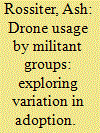

|
|
|
|
|
| Summary/Abstract |
Judging by recent media reporting and pronouncements by senior US military and security officials, the use of drones by militant groups is both reshaping conflict between armed non-state actors and state parties and now presents a grave and direct threat to nations in the West and elsewhere. But does this threat warrant the attention it is currently receiving? To answer this question, this article surveys how various militant groups have used drones both tactically on the battlefield and for wider strategic purposes. Closely examining how drones have been employed and by whom provides a basis for understanding variation in adoption. The article shows how drone usage or non-usage is highly contingent on the setting of the conflict, the aims of different groups, and the capacity of groups to adopt the technology. Though advances in drone technology could make the use-case more appealing for militant groups, drones will be subject to the same back-and-forth, techno-tactical adaptation dynamic between adversaries that have accompanied prior military innovations.
|
|
|
|
|
|
|
|
|
|
|
|
|
|
|
|
| 3 |
ID:
177279
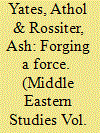

|
|
|
|
|
| Summary/Abstract |
It has long been observed that the development of professional security institutions is a key stage in modern state formation. Leaders of many proto-states embarking on programs of rapid development – such as many of the rulers of the Arab Gulf States in the 1960s – have brought in foreign professional expertise to assist in building up fledgling state institutions, including militaries, police forces and intelligence services. We know little, however, about the relationship between ruler and these key expatriates performing these functions. To help fill this lacuna, this article examines the first three expatriate professional heads of Abu Dhabi Police over the period 1959-68 and their relationship with their paymasters – first Shaikh Shakhbut bin Sultan Al Nahyan, then his brother, Shaikh Zayed. It details the difficulties these professional expatriates faced in operating within this ruler-dominated political-administration system. We believe observations made in this study have relevance to the contemporary Gulf, where governments continue to employ highly skilled expatriates in their security institutions and much else besides.
|
|
|
|
|
|
|
|
|
|
|
|
|
|
|
|
| 4 |
ID:
172567
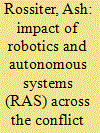

|
|
|
|
|
| Summary/Abstract |
Technology is often held up to be a key – if not the key, for some at least – driver in shaping the character or even perhaps the nature of war. The introduction of new technologies has resulted in novel and, usually by implication, more effective ways of conducting warfare. Indeed, many leading military thinkers have identified new technology – both of civilian and military origins – as the source of many of history’s military revolutions, or so-called major military innovations (MMIs), as others have termed radical change in military affairs.
|
|
|
|
|
|
|
|
|
|
|
|
|
|
|
|
| 5 |
ID:
174207
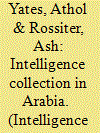

|
|
|
|
|
| Summary/Abstract |
Imperial powers, facing considerable information challenges in far-flung territories, adapted intelligence practices and machinery to fit local conditions. In contrast to the attention placed on British intelligence activities in territories considered within the ‘formal empire’ (i.e. where Britain was in direct control), we know very little about intelligence arrangements in ‘informal empire,’ where external powers exerted influence and protected their interests by working through local elites. Exploiting declassified documents and drawing upon interviews with retired intelligence officials, this article reveals Britain’s unique intelligence system in a remote corner of empire – the Trucial States (today’s United Arab Emirates) – which was built around a group of roaming officers tasked with collecting full-spectrum intelligence.
|
|
|
|
|
|
|
|
|
|
|
|
|
|
|
|
| 6 |
ID:
170248


|
|
|
|
|
| Summary/Abstract |
When it comes to states arming themselves, it has become axiomatic among scholars of comparative defence industries that go-it-alone production is no longer an option for most. The processes associated with defence-industrial globalization combined with the ever-rising costs of producing leading-edge weapons systems present huge disincentives for autarky in armaments. Against these strong headwinds, however, India has recently launched, as part of a broader, multi-sector initiative called Make in India, a renewed effort to achieve greater self-reliance in armaments production. This article first places India’s recent defence indigenization efforts within wider discussions about states’ armament strategies and trends in global arms production. Secondly, it contextualizes the drivers behind New Delhi’s latest attempts to transform itself from leading arms importer to major producer (and significant exporter) against the backdrop of past efforts which have yielded little but disappointment. Third, it explicates the main facets of the current strategy for defence-industrial indigenization and gauges its chances for success. To preview the main findings, we argue that self-reliance in armaments via indigenous production will almost certainly continue to allude India because of systemic, structural and technological constraints.
|
|
|
|
|
|
|
|
|
|
|
|
|
|
|
|
| 7 |
ID:
179022
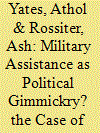

|
|
|
|
|
| Summary/Abstract |
What motivates states to provide others with military assistance? Traditional explanations naturally focus on the security interests of the sender state. But could domestic considerations – intra-party politics, for example – also be a factor in some cases? This analysis, which examines the British decision to send a Military Advisory Team [MAT] to the newly federated United Arab Emirates [UAE] in 1971, answers in the affirmative. It demonstrates that the MAT was primarily, albeit not exclusively, a means by which the British government of Prime Minister Edward Heath could stave off sharp criticism from fellow Conservative politicians that under his leadership that Britain was cutting and running from its overseas responsibilities. Furthermore, because the MAT was in inception a political tool, its military utility in assisting the UAE, or the influence Britain derived from its presence, was minimal at best and counterproductive at worst.
|
|
|
|
|
|
|
|
|
|
|
|
|
|
|
|
| 8 |
ID:
190871
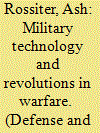

|
|
|
|
|
| Summary/Abstract |
The collection of essays in the special debate tackle the claim that drones deserve their acquired status as a revolutionary technology that has indelibly recast warfare. It is a debate embedded within a long-running and contentious, broader discussion about the role technology plays an independent variable affecting the character and perhaps the nature of war. How far can the introduction of a new technology really alter ways of fighting or radically impact battlefield outcomes? The complexity of the issue is reflected in the diversity of positions and approaches taken by the debaters. The purpose of these papers is not to arrive at a conclusion through a dialectic process; rather, readers are left to form their own views after weighing up the strengths of the arguments presented.
|
|
|
|
|
|
|
|
|
|
|
|
|
|
|
|
| 9 |
ID:
152467
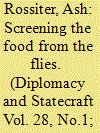

|
|
|
|
|
| Summary/Abstract |
This study looks at how the widening gap between Britain’s available military resources and its remaining overseas commitments in the 1960s affected its ability and willingness to protect Kuwait after the latter elected for independence in June 1961. It provides a fresh account of how successive British governments addressed the dilemma of providing adequate cover for the Kuwaiti commitment. Over the course of the decade, Britain found it increasingly difficult to maintain the minimum forces considered necessary for forestalling an attack from Kuwait’s principal threat – Iraq. The challenge of providing protection became more difficult by political conditions in Kuwait, which prohibited the stationing of troops, and the evolving nature of the Iraqi threat. British decision-makers increasingly saw the Kuwaiti military as a way to make up for the shortfall in cover and eventually replacing British protection altogether. This move towards self-reliance, however, would prove a failed strategy for Kuwait over the long term.
|
|
|
|
|
|
|
|
|
|
|
|
|
|
|
|
| 10 |
ID:
174159
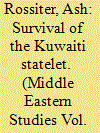

|
|
|
|
|
| Summary/Abstract |
For Kuwait in the 1920s, the most pressing problem was how to respond to the rising power of the neighbouring polity of Najd. Acting initially under the leadership of Ibn Saud, the future founder-king of Saudi Arabia, raiding Najdi tribes, many of whom followed the strict creed of Wahhabism and were referred to as Ikhwan (brotherhood), at one point threatened to conquer Kuwait. Moreover, Ibn Saud, who would later turn against recalcitrant elements of the Ikhwan, pressed his claims over large parts of Kuwaiti territory. This article analyzes how the Al Sabah rulers navigated through these turbulent waters. In particular, it explores how successive Kuwaiti leaders grappled with the uncertainty of British protection in their attempts to retain tiny Kuwait’s autonomy.
|
|
|
|
|
|
|
|
|
|
|
|
|
|
|
|
| 11 |
ID:
185356
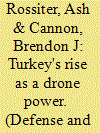

|
|
|
|
|
| Summary/Abstract |
Turkey's production and operational use of its own armed drones has grabbed much media attention and caused consternation in some regional capitals. Not only has Turkey emerged as one of the world's most prolific users of largely indigenously built armed drones but it has also become a major exporter of these systems. Analyses put Turkey's position as a major drone power down to long-term strategic calculation. Whilst Ankara's emergence as a serious drone player is certainly no accident – it is the output of a concerted state effort – this article emphasises how Turkish political-military leaders have absorbed military and political lessons from early forays into armed drone usage and adjusted foreign policy and military tactics accordingly. Such a non-linear evolution of its drone strategy suggests future change in how Turkey seeks to derive benefits from this niche capability.
|
|
|
|
|
|
|
|
|
|
|
|
|
|
|
|
| 12 |
ID:
188202
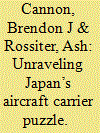

|
|
|
|
|
| Summary/Abstract |
Japan’s decision to convert two helicopter-carrying ships into fixed-wing aircraft carriers has generated criticism on two fronts. Military analysts question the military sense of carriers in the age of long-range precision missiles, while other domestic critics decry the move as a flagrant breach of Japan’s constitutional constraints on possessing senryoku (war potential) and one likely to provoke Japan’s neighbors, most notably China. Against this backdrop of criticism, why did the administration of Prime Minister Shinzo Abe take Japan back into the difficult business of carriers? This article argues that contrary to stated criticism, the carrier conversion program does provide Tokyo with tangible military benefits but these on their own are insufficient to explain the decision. Instead, we show the move is motivated in part by the desire to leverage carriers’ symbolic value for political ends.
|
|
|
|
|
|
|
|
|
|
|
|
|
|
|
|
|
|
|
|
|